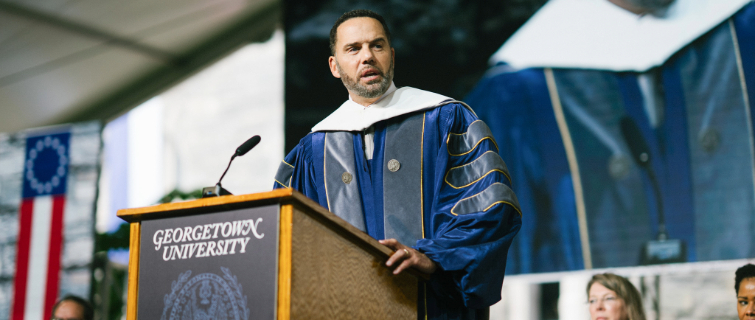
“Be a lighthouse for others, just as people in your life have been lighthouses for you,” best-selling author and human resources executive Steve Pemberton told 539 graduating students at the commencement ceremony for Georgetown University’s School of Continuing Studies.
Growing up in an abusive foster home, Pemberton found refuge in the very basement where he was punished for nonexistent transgressions, devouring books that one of his lighthouses—a neighbor who sensed his need and his potential—regularly delivered.
“Over 10 years, she kept bringing me a box of books,” Pemberton said, from a podium on Healy Lawn. “And some three decades later, when I sat down and asked her the question that has always been pressing to me—Why had she done that?—she, in the twilight of her life, smiled ever so gently and said, ‘Oh, that. Well, that was something my mother told me to do—give from where you are, with whatever you have.’”
Four Days of Celebration
Throughout the four days of Commencement, Georgetown awarded degrees to nearly 5,700 graduates, who joined the ranks of more than 230,000 Georgetown alumni.
In his address, Pemberton noted that, like the graduates seated on Healy Lawn, he attended a Jesuit university: Boston College. And while he can’t know for sure, Pemberton said, when St. Ignatius of Loyola founded the Jesuit order in 1540, he might have been influenced by the lighthouse and what it symbolizes.
“When St. Ignatius said, ‘Go, set the world aflame,’ he was not speaking of naked ambition for the pursuit of power disguised as service,” Pemberton said. “He was not speaking of reducing society to a series of contrived online algorithms, manufacturing distance, suspending the rules of decency and civility, or perpetuating the myth that those of us who are different are the ‘other.’ He was speaking of illumination, the power of the personal journey to light a path for others, to be a port in the storm, and, in doing so, show us our common humanity.”
Two Lights in the Darkness
Those who lit a path for Pemberton when he was young and suffering the constant stream of mental abuse in his foster home included the director of his school’s college access program “who insisted that I was college material, moved heaven and earth to make sure that it became a reality;" and, most importantly, a high school teacher, John Sykes, “who opened his home and his heart to me when I was 16, three days after Christmas, out of options, nowhere to go.”
Years later, Pemberton would recount his journey in the best-selling memoir, “A Chance in the World: An Orphan Boy, a Mysterious Past, and How He Found a Place Called Home,” which was made into a motion picture. Nine years later, Pemberton wrote “The Lighthouse Effect: How Ordinary People Can Have an Extraordinary Impact in the World,” which explores many of the themes he spoke to at Georgetown.
On a day honoring academic achievement, Pemberton urged the graduates to celebrate their accomplishments—and move on to something greater, beyond themselves.
“We need what [the lighthouse] symbolizes and we need what it calls us to do,” Pemberton said. “The lighthouse requires no explanation, because as soon as you see it, you know what it is. And that is why you will rarely see a name on a lighthouse. It doesn’t need branding. It seeks neither reward or recognition. It transcends time. It turns doubt into destination, sees possibilities over circumstances, and it shines without judgment that does not qualify your humanity before it shines its light on you.”
He concluded: “So, I would like to suggest to you—here, on this afternoon—that your life is that lighthouse.”